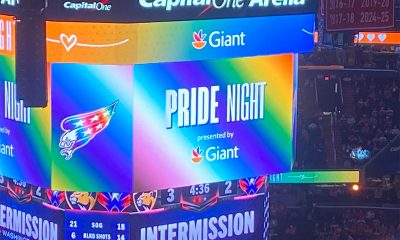Arts & Entertainment
Madge and beyond
Fall concert season dotted with biggest legends to hippest new underground queer acts

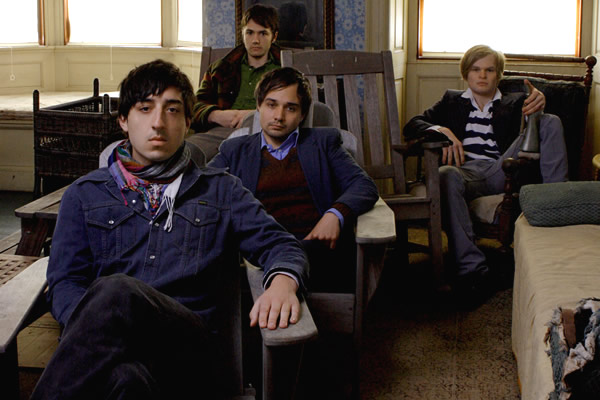
Grizzly Bear is touring its new album ‘Shields,’ which drops Tuesday. The band plays two sold out shows next week at the 9:30 Club. (Photo courtesy Warp Records)
A bounty of queer bands are slated for Phasefest which starts Thursday and runs through next weekend at Phase 1’s Eastern Market (original) location (525 8th Street S.E.). Look for indie bands like Bitch, Athen Boys Choir, Angie Head, People at Parties, Mitten, Hunter Valentine, D.C. band Glitterlust, Vanity Theft and many others. Weekend passes are $55. Tickets for individual nights are $15 Thursday, $20 for Sept. 22 and $25 for Sept. 22 and are available only at the door. Visit phasefest.com for details.
Grizzly Bear, whose new album “Shields” is slated to drop Tuesday, plays two nights at the 9:30 Club (815 V Street, N.W.) Sept. 20-21. Both shows are sold out. Gay singer/songwriter Ed Droste fronts the Brooklyn-based quartet. Try StubHub if you really want to go. Doors are 7 for the Thursday show; 8 for the Friday show. Unknown Mortal Orchestra opens.
Madonna brings her “MDNA Tour” to the Verizon Center (601 F Street, N.W.) Sept. 23-24, her first D.C. shows here since the “Re-Invention Tour” in 2004. Tickets were still available for the second night as of Blade press time but be warned the night of the show — as longtime fans now, she almost never starts on time. She didn’t go on in Philly a few weeks ago until almost 10:30 p.m. Check Ticketmaster or StubHub for availability.
Diamond Rings, a one-man outfit consisting of openly gay John O (his new album drops Oct. 22), opens for Stars at the 9:30 Club on Sept. 23. Doors are at 7. It’s sold out.
“Spill: True Stories of Queer Sex, Desire and Romance,” a new monthly performance event, kicks off at Black Fox Lounge (1723 Connecticut Ave. N.W.) at 8 p.m. on Sept. 27. It’s free. Bi New Yorker Jefferson hosts. More info at spillstories.wordpress.com.
Tony winner Sutton Foster (“Anything Goes,” “Thoroughly Mordern Millie” and “Shrek the Musical”) plays George Mason University’s Center for the Arts (on the George Mason campus in Fairfax County, Va.) Sept. 29 at 8 p.m. Tickets are available for $40, $55 and $70. Visit cfa.gmu.edu for information.
Broadway legend Patti LuPone brings her “Matters of the Heart” show to the Strathmore (5301 Tuckerman Lane, North Bethesda) for two nights Oct. 5-6. The 8 p.m. shows will find the double Tony winner singing love songs from a wide range of composers from Broadway legends like Rodgers and Hammerstein to pop singers such as Joni Mitchell and Cyndi Lauper. Tickets range from $45-$85. Buy online at Strathmore.org.
Look for ‘70s teen idol David Cassidy, inspiration for surely many gay coming-of-age fantasies, at the Birchmere Oct. 6. Tickets are $49.50 for the 7:30 p.m. show. Details at birchmere.com.
Shi-Queeta-Lee and her “cast of celebrity female impersonators” return to the Howard Theatre (620 T Street, N.W.) Oct. 10 for another “Drag Salute to the Divas” after a successful debut there in August. The lady poses as Mary J. Blige in the ads. Tickets are $20 in advance ($25 at the door) for the 8 p.m. show.
In other drag news, Special Agent Galactica (Jeffrey Johnson) plays Black Fox Lounge (1723 Connecticut Ave. N.W.) every second and fourth Friday of the month from 6-9 p.m. and the first Tuesday of each month she brings her “Ye Olde Rock ‘n Roll Show” to MOVA (2204 14th Street) from 8-10 p.m. All free. Details at pinkhairedone.com.
Queer Women of Color successfully raised $5,000 in an online drive for its third annual Revival Poetry Tour that’s slated to wrap in D.C. Oct. 13. Details pending.
Soul legend Mavis Staples plays the Hamilton (600 14th Street, N.W.) Oct. 17. Tickets are $55-$62 for the 7:30 p.m. show. Info at thehamiltondc.com.
It’s a trek from D.C., but if you want to catch Liza Minnelli’s fall show “Confessions,” the closest spot is the Luhrs Performing Arts Center (1871 Old Main Drive) in Shippensburg, Pa., on the campus of Shippensburg University. It’s about a two-hour drive from D.C. Tickets range from $67-$95. Details at luhrscenter.com.
Perrenniel lesbian road warriors The Indigo Girls are slated to play Rams Head Live (20 Market Place) in Baltimore Oct. 20. Tickets are $35 for the 9 p.m. show. Check ticketfly.com for tickets or link there through ramsheadlive.com.
Gay comedian David Sedaris plays the Strathmore Oct. 23. Tickets range from $48-$58 for the 8 p.m. show. Details at Strathmore.org.
Of course there’s an ocean of stuff going on all the time in New York, but if you happen to be there Oct. 30 (the night of the High Heel Race in D.C., by the way), consider checking out a special Freedom to Marry concert there featuring Rufus Wainwright, They Might Be Giants, John Cameron Mitchell, Justin Bond and more. It will be held at the Beacon Theatre (2124 Broadway, New York) at 8 p.m. and 100 percent of the $50-$155 tickets benefit LGBT advocacy group Freedom to Marry (Rufus’s dad, Loudon Wainwright III, who’s been playing a new song he just wrote for Rufus’s gay wedding at his summer shows, plays the Birchmere Oct. 12-13).
Lesbian rocker Melissa Etheridge plays the Strathmore Nov. 2 for her “4th Street Feeling Tour.” Tickets range from $57.50-$102.50. Details at Strathmore.org.
The Gay Men’s Chorus of Washington has its Home Cooked Cabaret night dubbed “Showmen and Showstoppers” at Town Danceboutique (2009 8th Street N.W.) Nov. 3 at 6:30 p.m. Tickets are $100 for reserved seats or $75 general admission. Visit gmcw.org for information.
Dance diva Stephanie Mills plays the Birchmere Nov. 10. Tickets are $69.50 (birchmere.com).
Aretha Franklin plays DAR Constitution Hall (1776 D Street, NW) Nov. 20. Tickets are $59.50-$115.50 at Ticketmaster.
The Chorus’s “Winter Nights” show is the weekend of Nov. 30-Dec. 1 at the Lisner Auditorium (730 21st Street, N.W.). No word yet on ticket prices for that show.
That’s the big stuff but a few other venues to keep an eye on or plan checking out include gay-owned Comet Ping Pong (5037 Connecticut Ave., N.W.), a gay-owned pizza restaurant, live music venue that hosts indie bands — some queer — all the time. Info at cometpingpong.com.
The Clarice Smith Performing Arts Center at the University of Maryland (claricesmithcenter.umd.edu), the Washington Performing Arts Society (wpas.org) and Wolf Trap (wolftrap.org) all have great events scheduled throughout the fall.
a&e features
Transmission DC breathes new life into a storied sound space
A fresh home for boundary-pushing culture on H Street

Late last year, phoenix-style, a fresh home for boundary-pushing culture arose on the H Street corridor. Transmission DC – a queer, trans, and POC-owned, operated, and centered community-focused venue – powered on in the former home to the Rock & Roll Hotel (famously, not a hotel, but very much rock & roll). Transmission (1353 H St., N.E.) arrives secure in its mandate – or even birthright – to provide a place to celebrate creativity and music through a lens of inclusivity and respect.
Transmission’s team brings experience, but also representation. Owners/partners Kabir Khanna (who is also programming director), Katii B, Ellie McDyre, and Kelli Kerrigan together previously managed 618 productions, a venue in Chinatown, crafting “some of D.C.’s freakiest parties, raves, and mosh pits” they note.
They packed up operations last fall to a space curated specifically for D.C.’s underground music and culture scene, building their efforts in Chinatown to bring in more fans in queer and POC circles.
Transmission, Khanna points out, is built on DIY values. In the music scene, DIY means that promoters and organizers – often disconnected from the mainstream and part of marginalized communities – build shows and programs collaboratively, but independently from institutions, supporting each other as smaller, independent venues close. Here, Transmission aims to ensure that those putting together these underground inclusive shows have a more permanent and stable home, can have access to resources, and can provide more sustainable income to artists. “We’re trying to get more people to support and enjoy the music, and also give artists and organizers within the DIY community more structure and a larger cut,” says Khanna.
Khanna also notes that Transmission operates “under the principles of safety, inclusivity, and respect.” McDyre added that even at venues that claim inclusivity, that statement might not take place in practice. We’re “not just pitting up a rainbow flag,” says McDyre, but as some of the owners are trans and POC, audiences can see themselves reflected at the top.
Much like the DIY nature of the music community, the Transmission owners brought a DIY ethos to turning around their space.
In March 2020 – the height of COVID lockdowns – Rock & Roll Hotel suddenly shuttered, though not due to the pandemic; instead, the venue claimed that decreasing sales and increasing competition led to the closure. For 14 years, it was the central spot for cheap beer and lesser-known and celebrated acts. The space stood vacant for more than five years, until Transmission turned the power back on.
“When we got into the space, it was effectively abandoned for years,” says Khanna. “There was a ton of mold, and paint primer covering all surfaces. It was nearly falling apart.” Khanna noted that many music venues like this one, regardless of how well it was maintained, “get the shit kicked out of it,” given the nature of shows. The team called in mold removal contractors, ripped up most of the floorboards, and started fresh.
Transmission’s first floor is styled as a stripped-down black box: the better to take in the music. “It’s minimal on purpose to act as a canvas for set design and music,” without a specific aesthetic, says Khanna. Moving upstairs, the second floor has been opened up, removing some walls, and now has a larger dance area than the first floor. Beyond the first two performance levels, and a holdover from Rock & Roll Hotel, is the rooftop. Though without a stage, the rooftop space is filled with murals splashed across the walls, with a full bar. Transmission’s current capacity is 496, but the team is looking to grow that number. Transmission will also leverage the full kitchen that Rock & Roll Hotel operated, bringing in Third Hand Kitchen to offer a variety of food, including vegan and vegetarian options.
Khanna pointed out an upcoming show reflective of Transmission’s inclusive ethos: Black Techo Matters on Feb. 27. The event is set to be “a dynamic, collaborative night of underground electronic music celebrating Black History Month.” Khanna says that techno came from Black music origins, and this event will celebrate this genesis with a host of artists, including DJ Stingray 313, Carlos Souffront, and Femanyst.
Movies
Moving doc ‘Come See Me’ is more than Oscar worthy
Poet Laureate Andrea Gibson, wife negotiate highs and lows of terminal illness

When Colorado Poet Laureate Andrea Gibson died from ovarian cancer in the summer of 2025, the news of their passing may have prompted an outpouring of grief from their thousands of followers on social media, but it was hardly a surprise.
That’s because Gibson – who had risen to both fame and acclaim in the early 2000s with intense live performances of their work that made them a “superstar” at Poetry Slam events – had been documenting their health journey on Instagram ever since receiving the diagnosis in 2021. During the process, they gained even more followers, who were drawn in by the reflections and explorations they shared in their daily posts. It was really a continuation, a natural evolution of their work, through which their personal life had always been laid bare, from the struggles with queer sexuality and gender they experienced in their youth to the messy relationships and painful breakups of their adult life; now, with precarious health prohibiting a return to the stage, they had found a new platform from which to express their inner experience, and their fans – not only the queer ones for whom their poetry and activism had become a touchstone, but the thousands more who came to know them through the deep shared humanity that exuded through their online presence – were there for it, every step of the way.
At the same time, and in that same spirit of sharing, there was another work in progress around Gibson: “Come See Me in the Good Light,” a film conceived by their friends Tig Notaro and Stef Willen and directed by seasoned documentarian Ryan White (“Ask Dr. Ruth”, “Good Night, Oppy”, “Pamela, a Love Story”), it was filmed throughout 2024, mostly at the Colorado home shared by Gibson and their wife, fellow poet Megan Falley, and debuted at the 2025 Sundance Film Festival before a release on Apple TV in November. Now, it’s nominated for an Academy Award.
Part life story, part career retrospective, and part chronicle of Gibson and Falley’s relationship as they negotiate the euphoric highs and heartbreaking lows of Gibson’s terminal illness together, it’s not a film to be approached without emotional courage; there’s a lot of pain to be vicariously endured, both emotional and physical, a lot of hopeful uplifts and a lot of crushing downfalls, a lot of spontaneous joy and a lot of sudden fear. There’s also a lot of love, which radiates not only from Gibson and Falley’s devotion and commitment to being there for each other, no matter what, but through the support and positivity they encounter from the extended community that surrounds them. From their circle of close friends, to the health care professionals that help them navigate the treatment and the difficult choices that go along with it, to the extended family represented by the community of fellow queer artists and poets who show up for Gibson when they make a triumphant return to the stage for a performance that everyone knows may well be their last, nobody treats this situation as a downer. Rather, it’s a cause to celebrate a remarkable life, to relish friendship and feelings, to simply be present and embrace the here and now together, as both witness and participant.
At the same time, White makes sure to use his film as a channel for Gibson’s artistry, expertly weaving a showcase for their poetic voice into the narrative of their survival. It becomes a vibrant testament to the raw power of their work, framing the poet as a seminal figure in a radical, feminist, genderqueer movement which gave voice to a generation seeking to break free from the constraints of a limited past and imagine a future beyond its boundaries. Even in a world where queer existence has become – yet again – increasingly perilous in the face of systemically-stoked bigotry and bullying, it’s a blend that stresses resilience and self-empowerment over tragedy and victimhood, and it’s more than enough to help us find the aforementioned emotional courage necessary to turn what is ultimately a meditation on dying into a validation of life.
That in itself is enough to make “Come See Me in the Good Light” worthy of Oscar gold, and more than enough to call it a significant piece of queer filmmaking – but there’s another level that distinguishes it even further.
In capturing Gibson and Falley as they face what most of us like to think of as an unimaginable future, White’s quietly profound movie puts its audience face-to-face with a situation that transcends all differences not only of sexuality or gender, but of race, age, or economic status as well. It confronts us with the inevitability few of us are willing to consider until we have to, the unhappy ending that is rendered certain by the joyful beginning, the inescapable conclusion that has the power to make the words “happily ever after” feel like a hollow promise. At the center of this loving portrait of a great American artist is a universal story of saying goodbye.
Yes, there is hope, and yes, good fortune often prevails – sometimes triumphantly – in the ongoing war against the cancer that has come to threaten the palpably genuine love this deeply-bonded couple has found together; but they (and we) know that, even in the best-case scenario, the end will surely come. All love stories, no matter how happy, are destined to end with loss and sorrow; it doesn’t matter that they are queer, or that their gender identities are not the same as ours – what this loving couple is going through, together, is a version of the same thing every loving couple lucky enough to hold each other for a lifetime must eventually face.
That they meet it head on, with such grace and mutual care, is the true gift of the movie.
Gibson lived long enough to see the film’s debut at Sundance, which adds a softening layer of comfort to the knowledge we have when watching it that they eventually lost the battle against their cancer; but even if they had not, what “Come See Me in the Good Light” shows us, and the unflinching candor with which it does so, delivers all the comfort we need.
Whether that’s enough to earn it an Oscar hardly matters, though considering the notable scarcity of queer and queer-themed movies in this year’s competition it might be our best shot at recognition.
Either way, it’s a moving and celebratory film statement with the power to connect us to our true humanity, and that speaks to a deeper experience of life than most movies will ever dare to do.
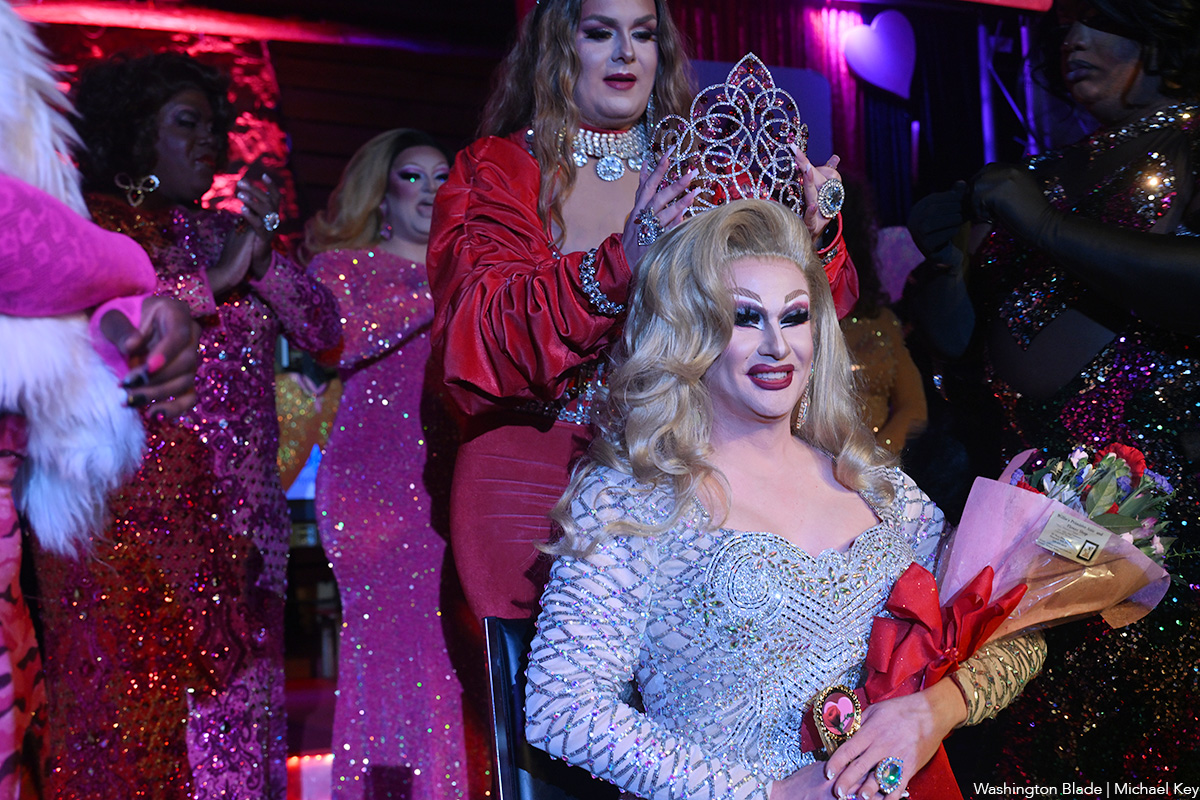
The 44th annual Queen of Hearts pageant was held at The Lodge in Boonsboro, Md. on Friday, Feb. 20. Six contestants vied for the title and Bev was crowned the winner.
(Washington Blade photos by Michael Key)
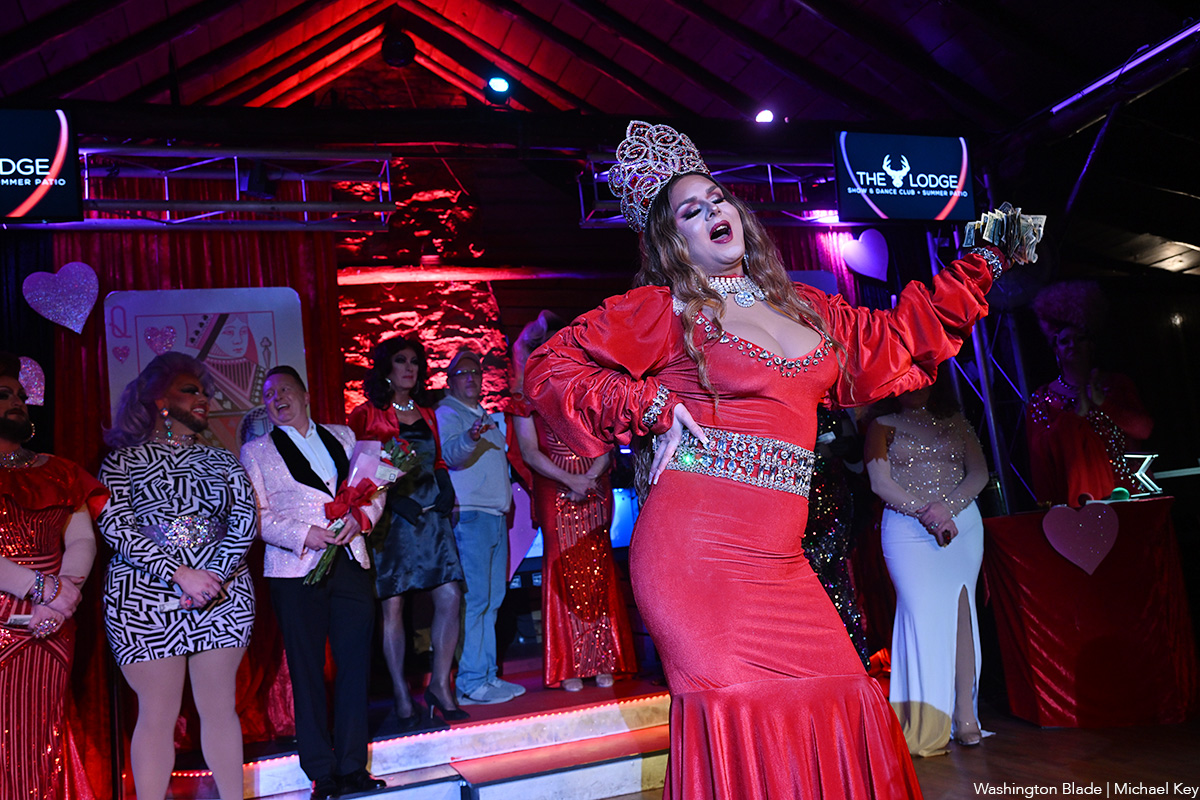
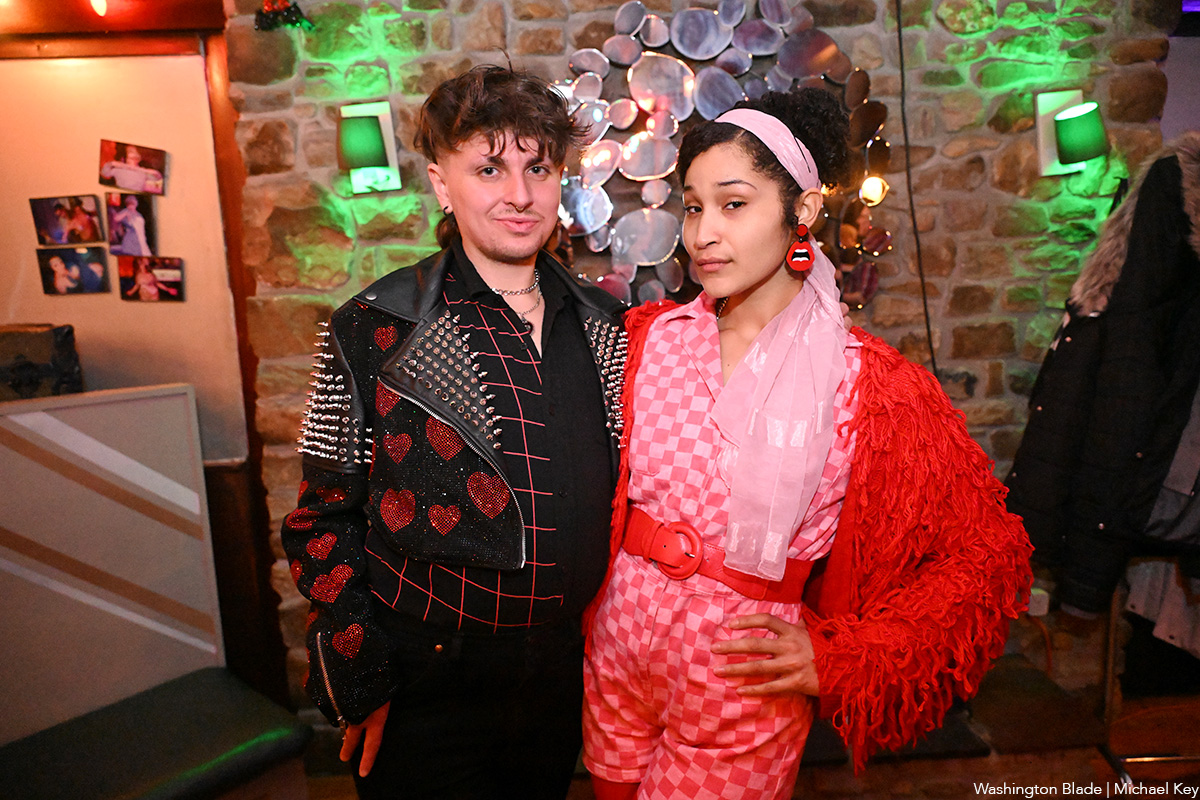
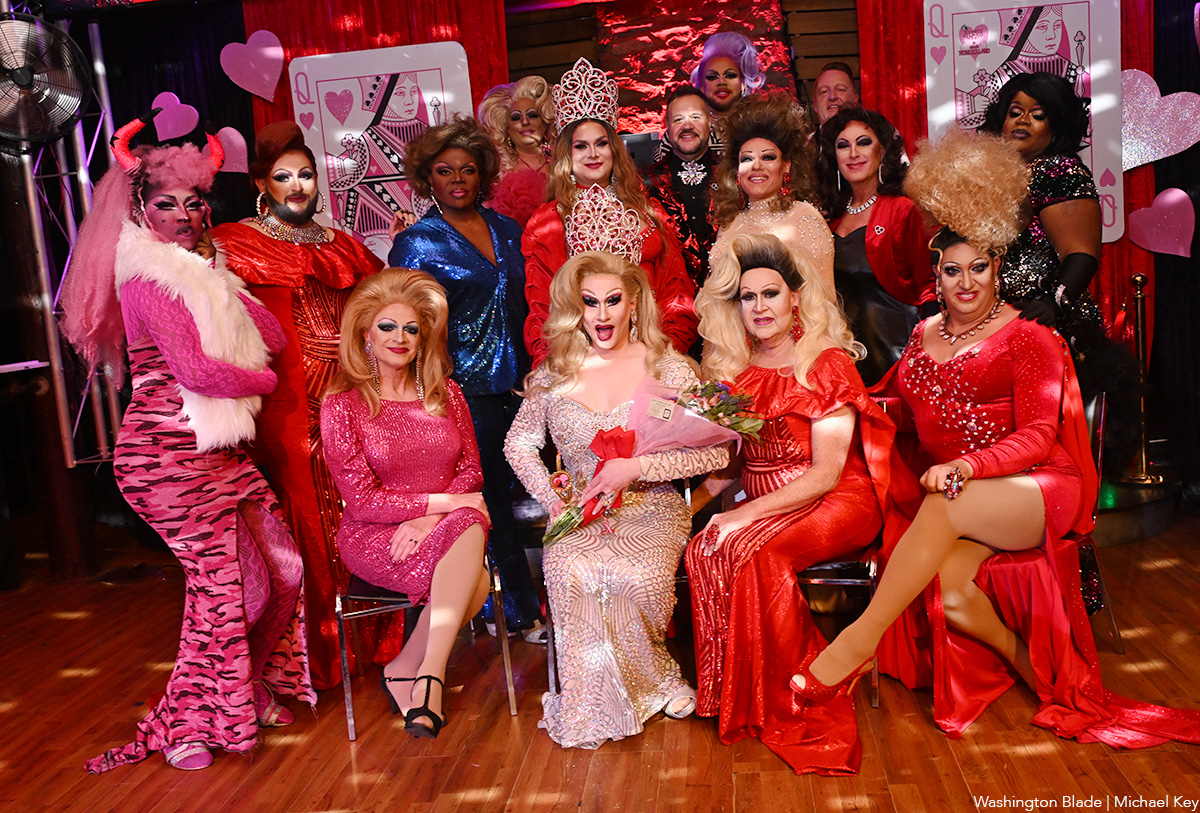
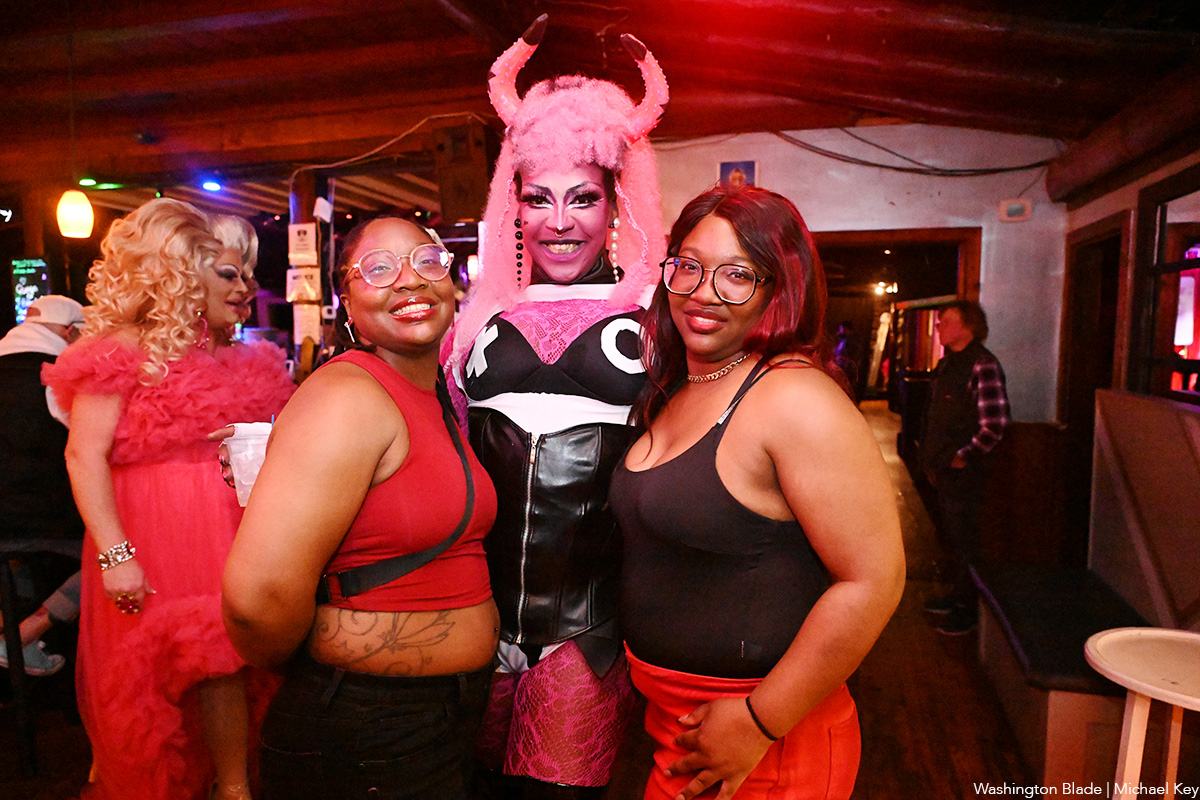
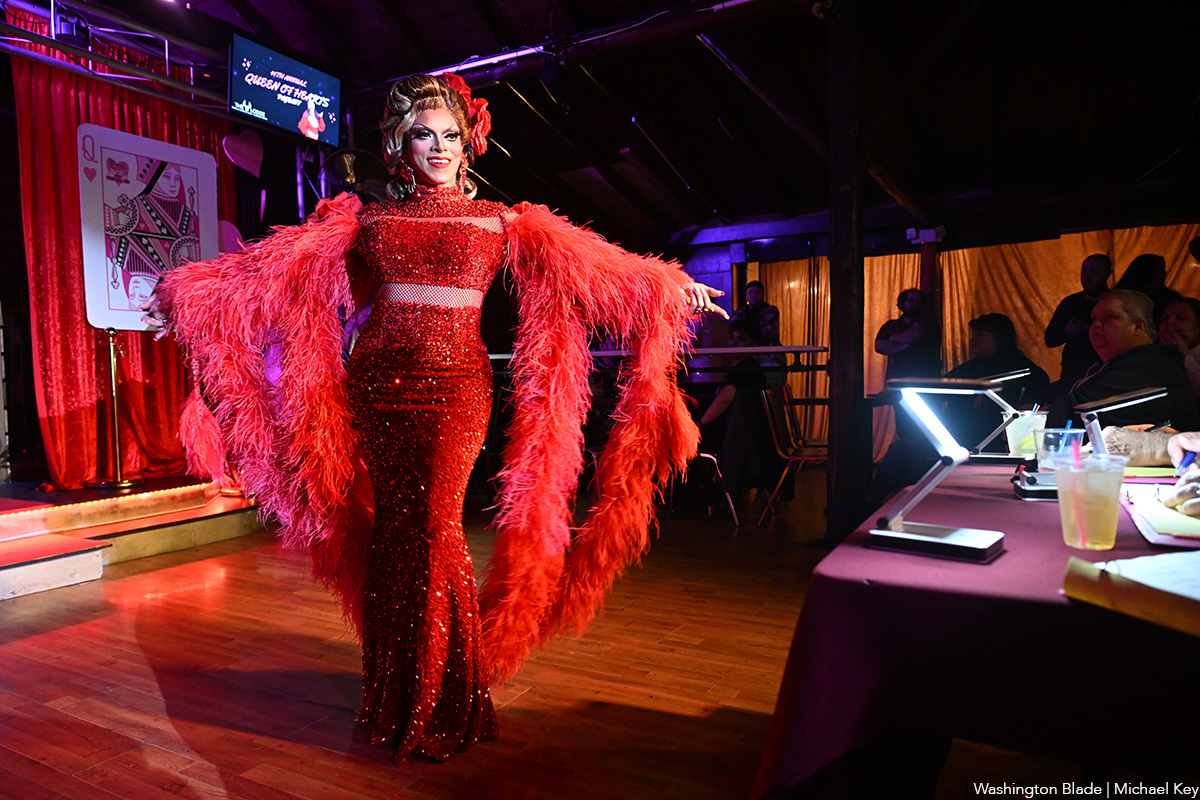
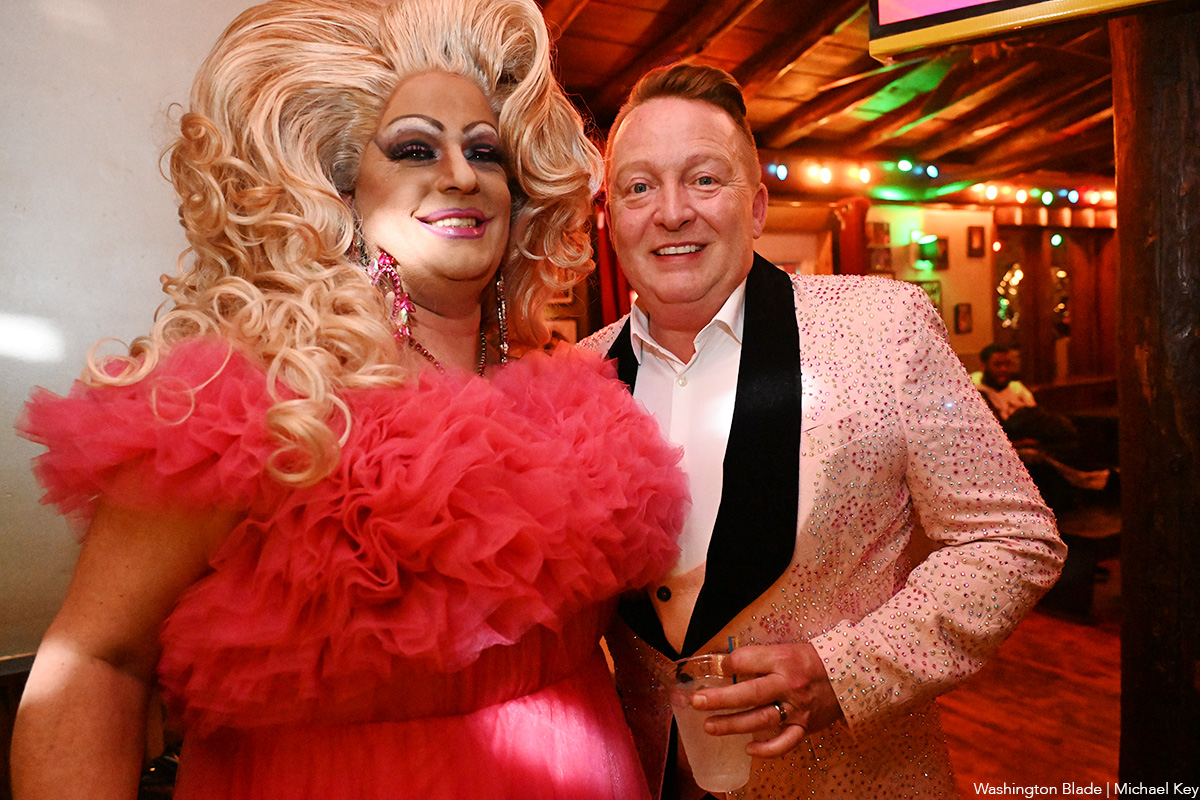
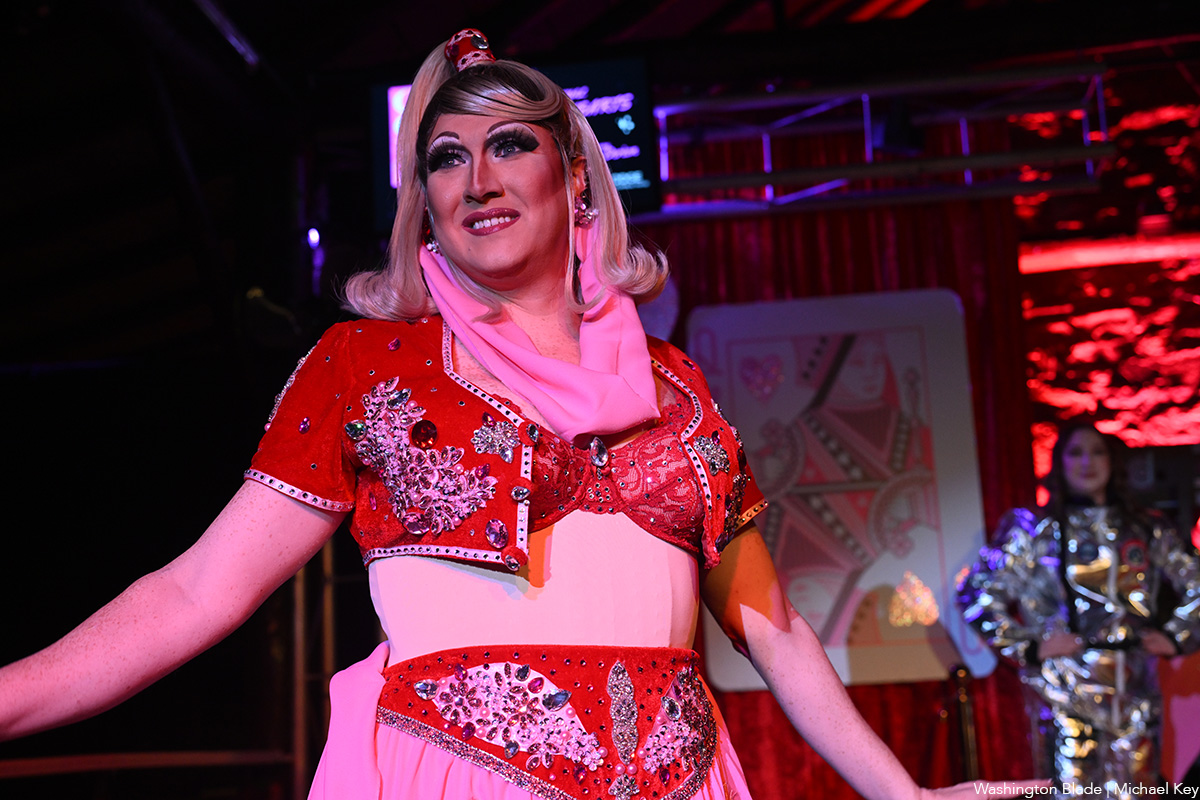
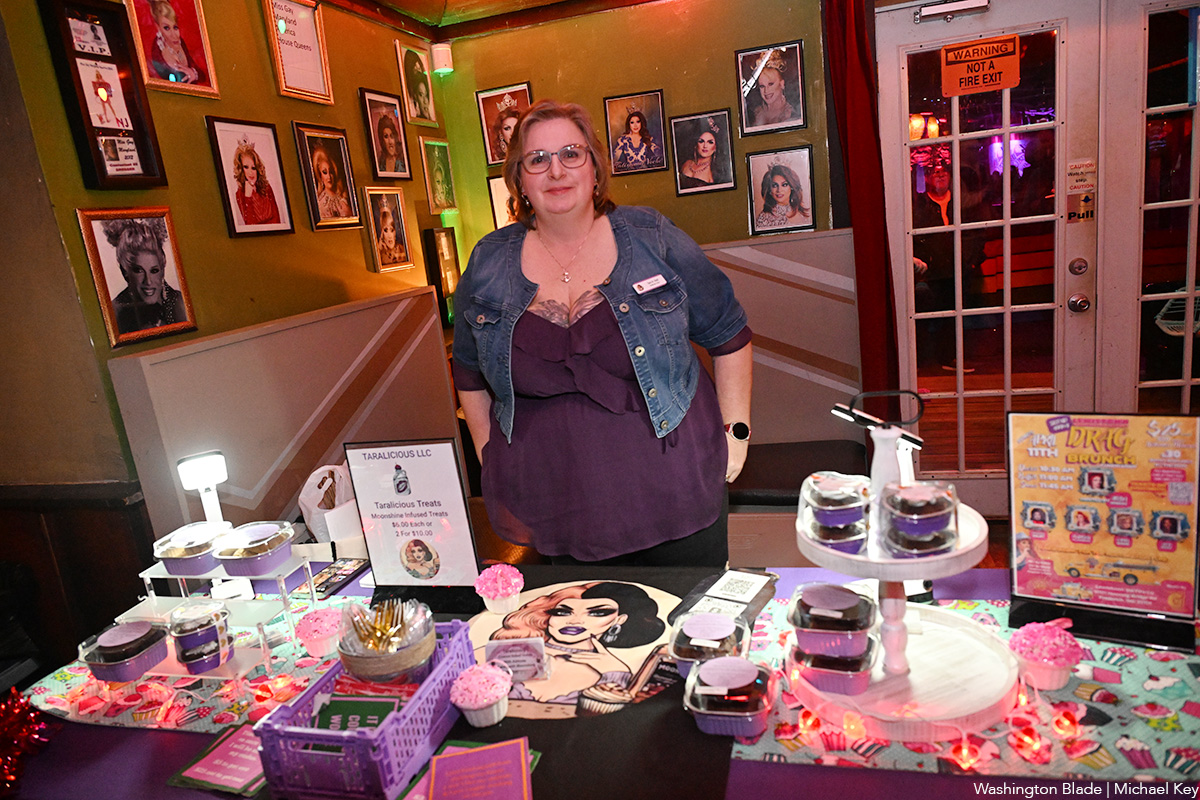
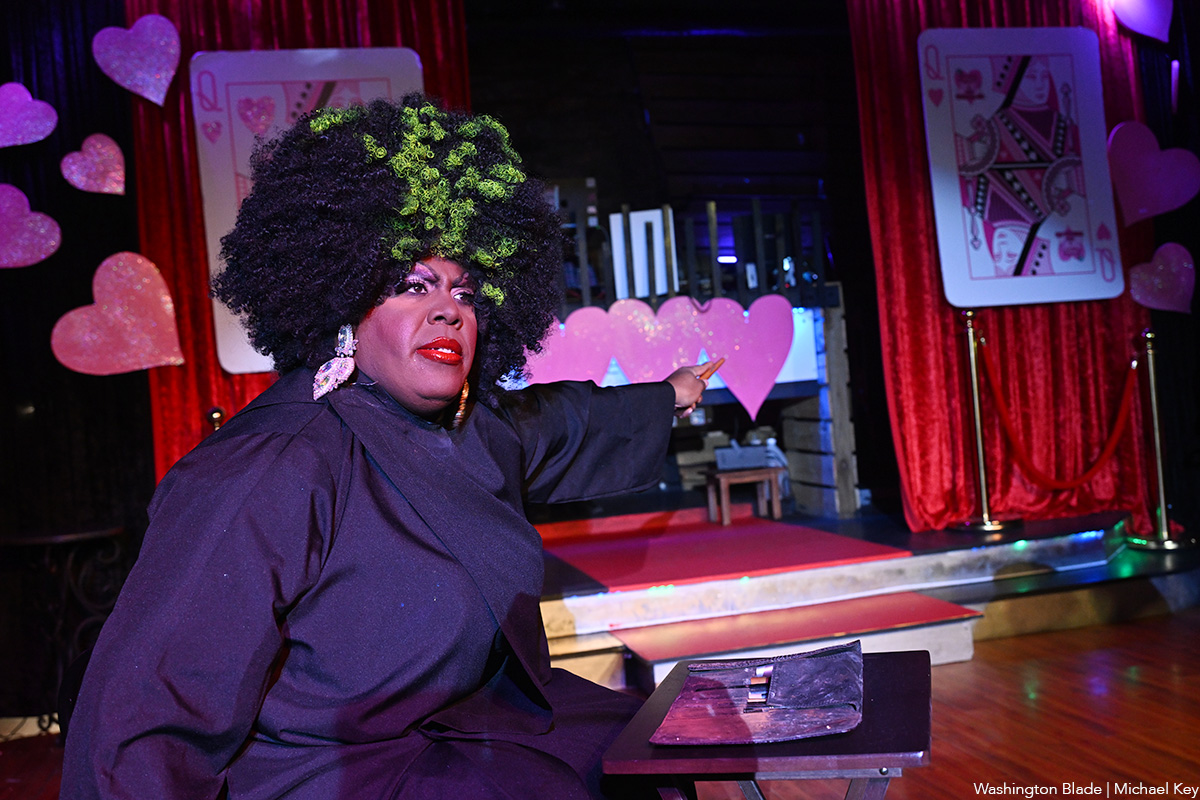
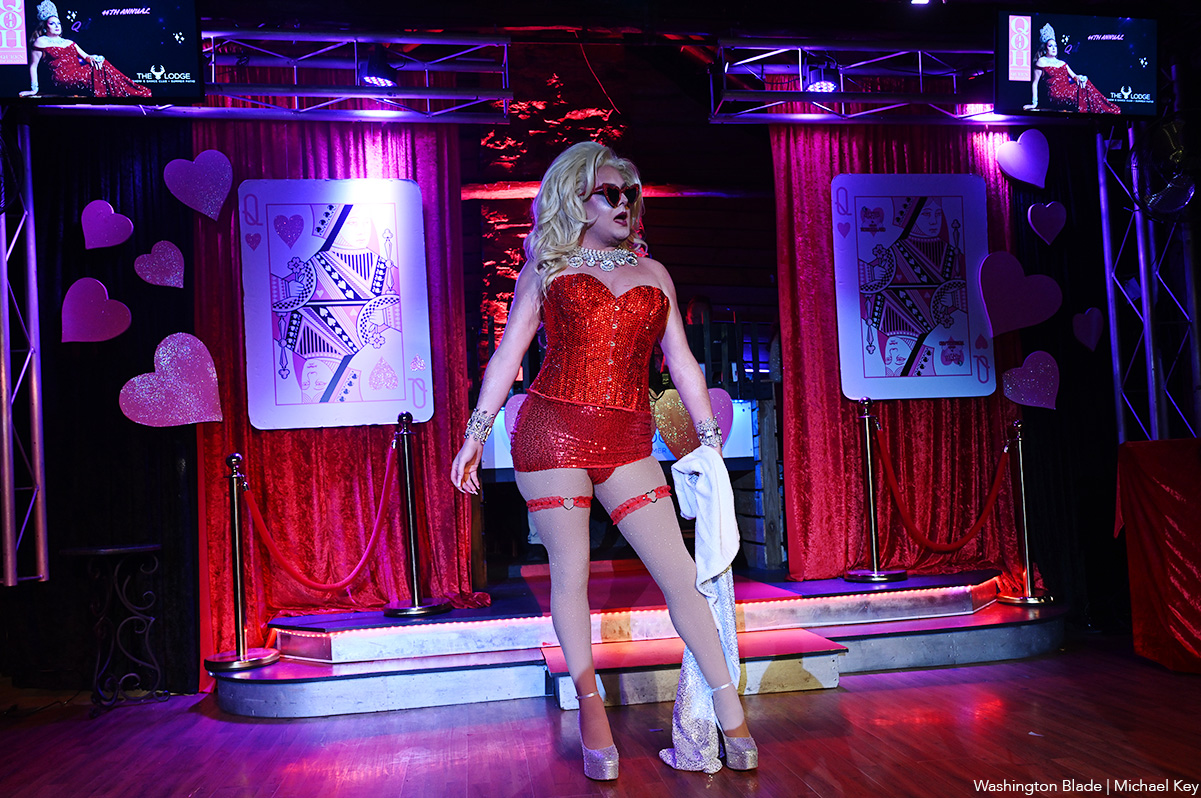
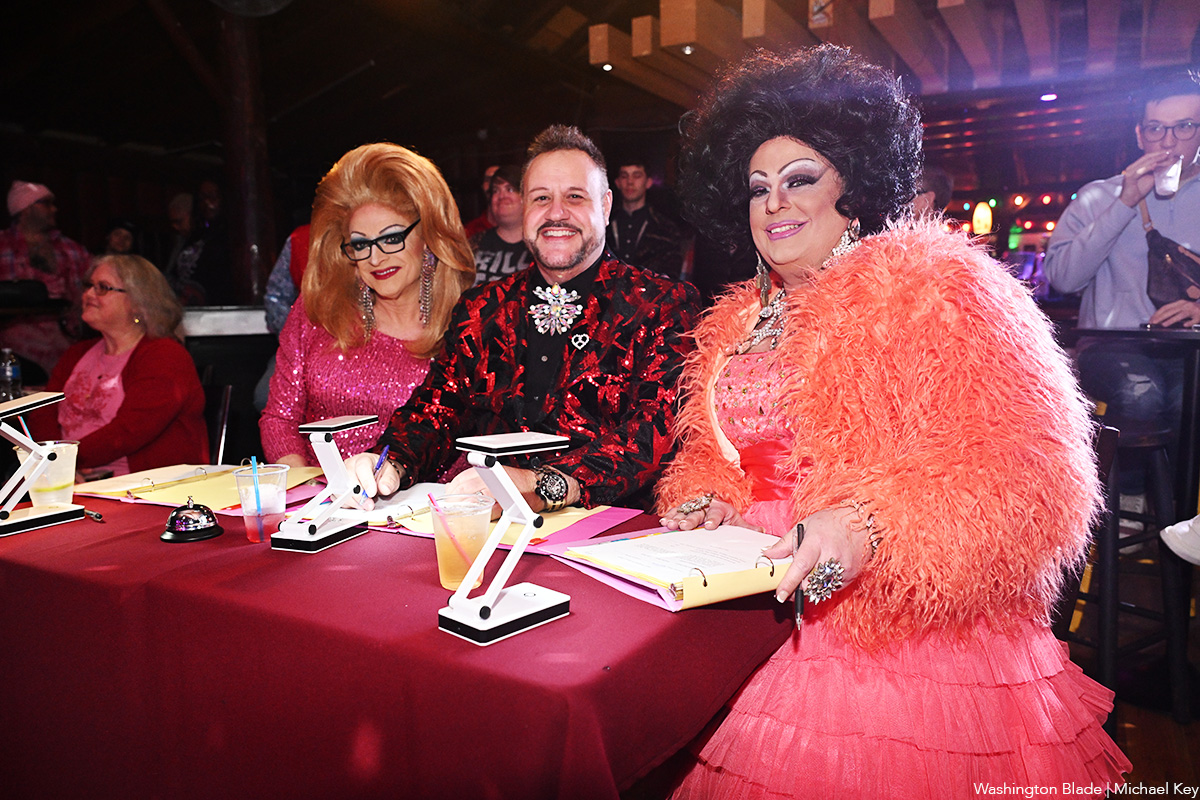
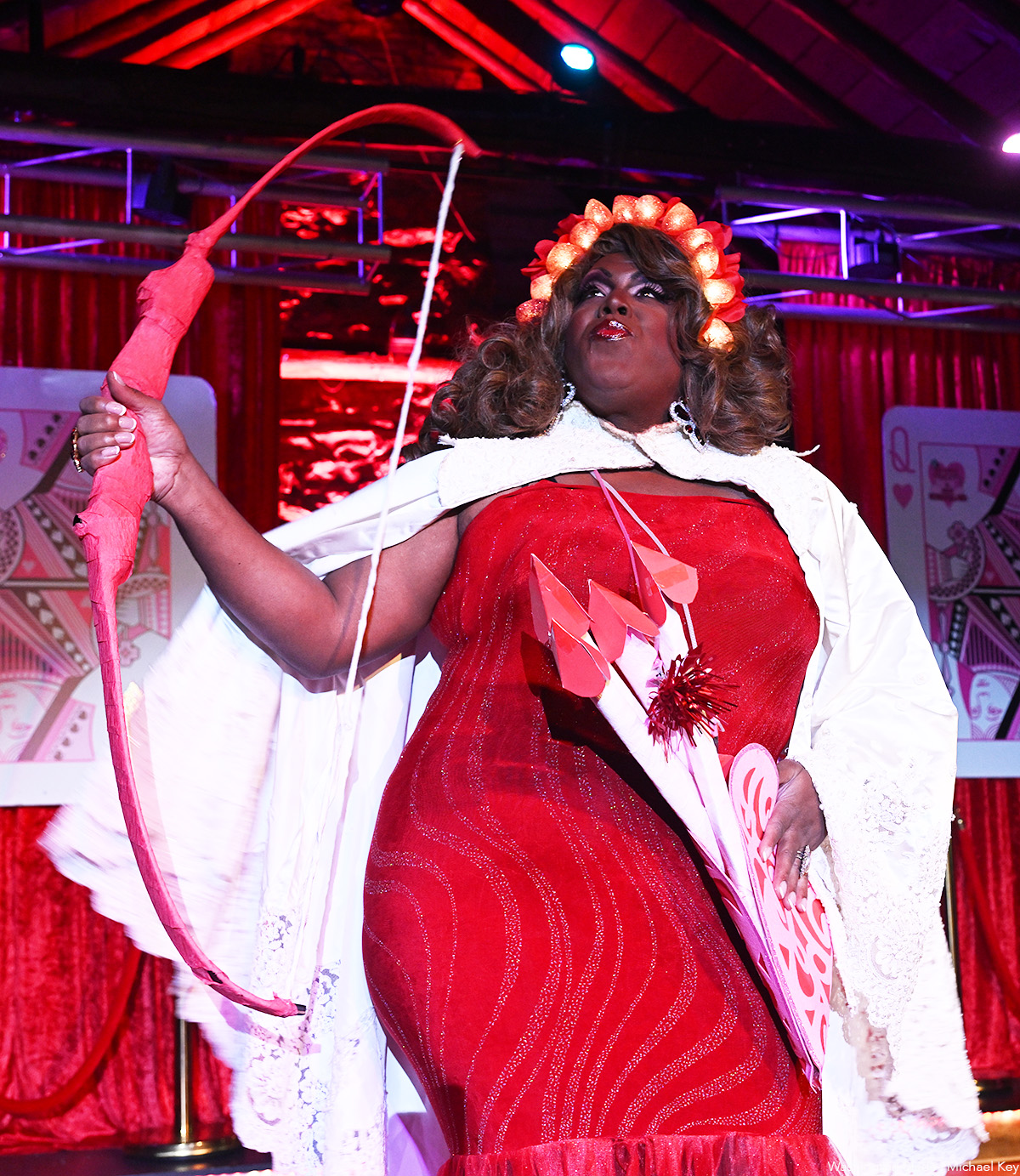
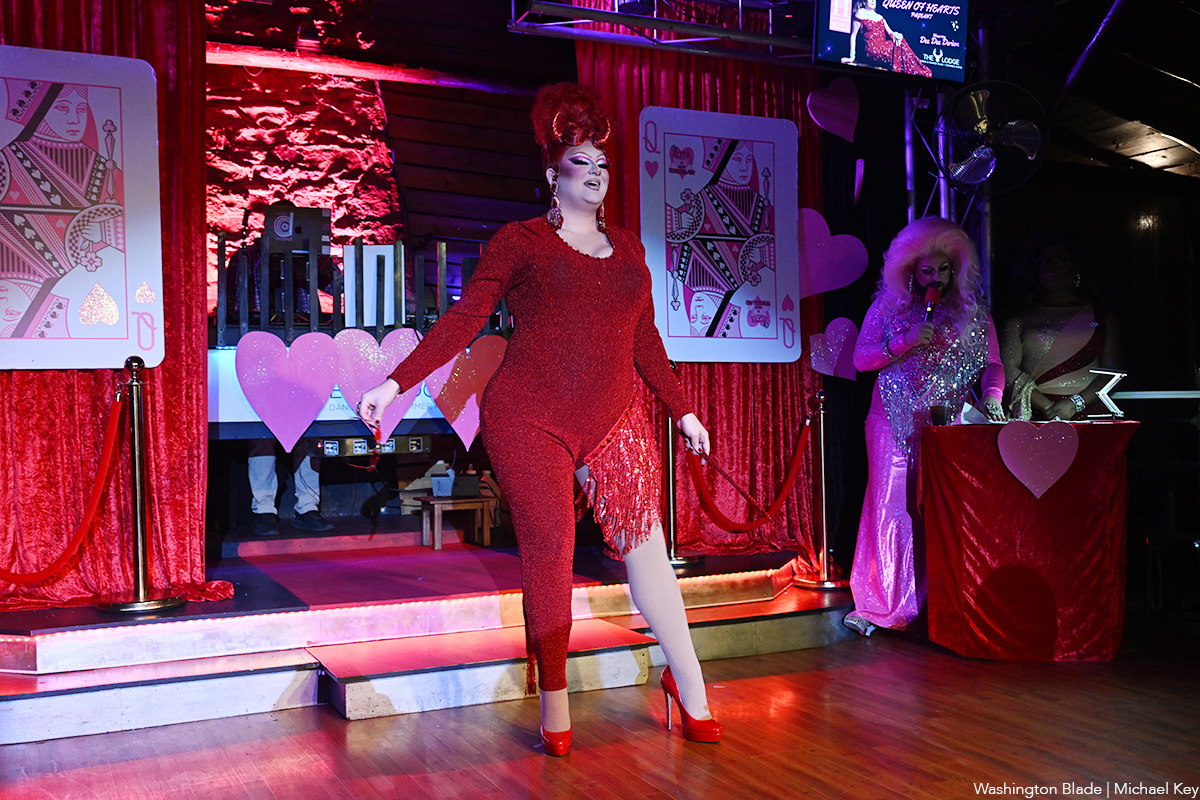
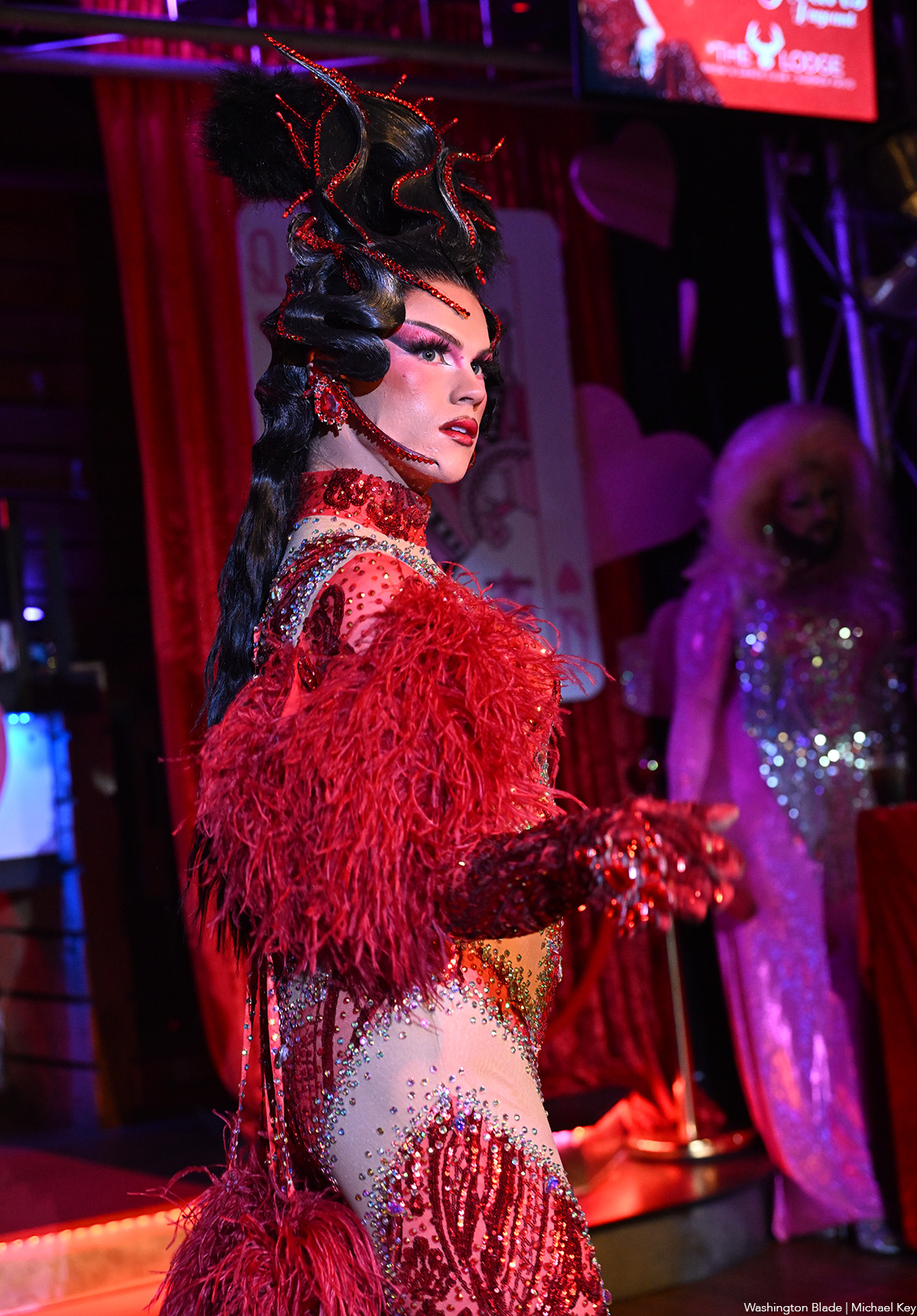
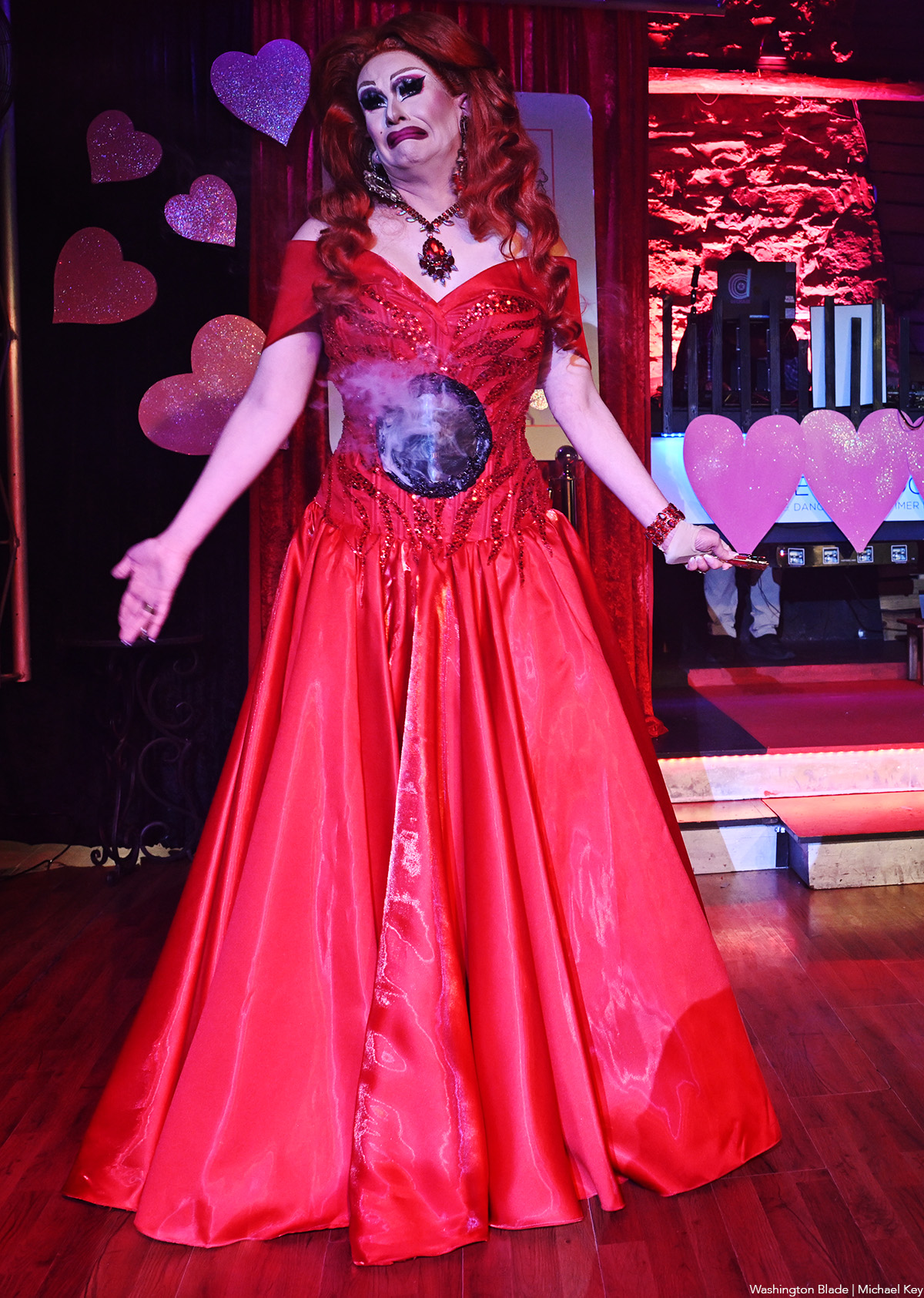
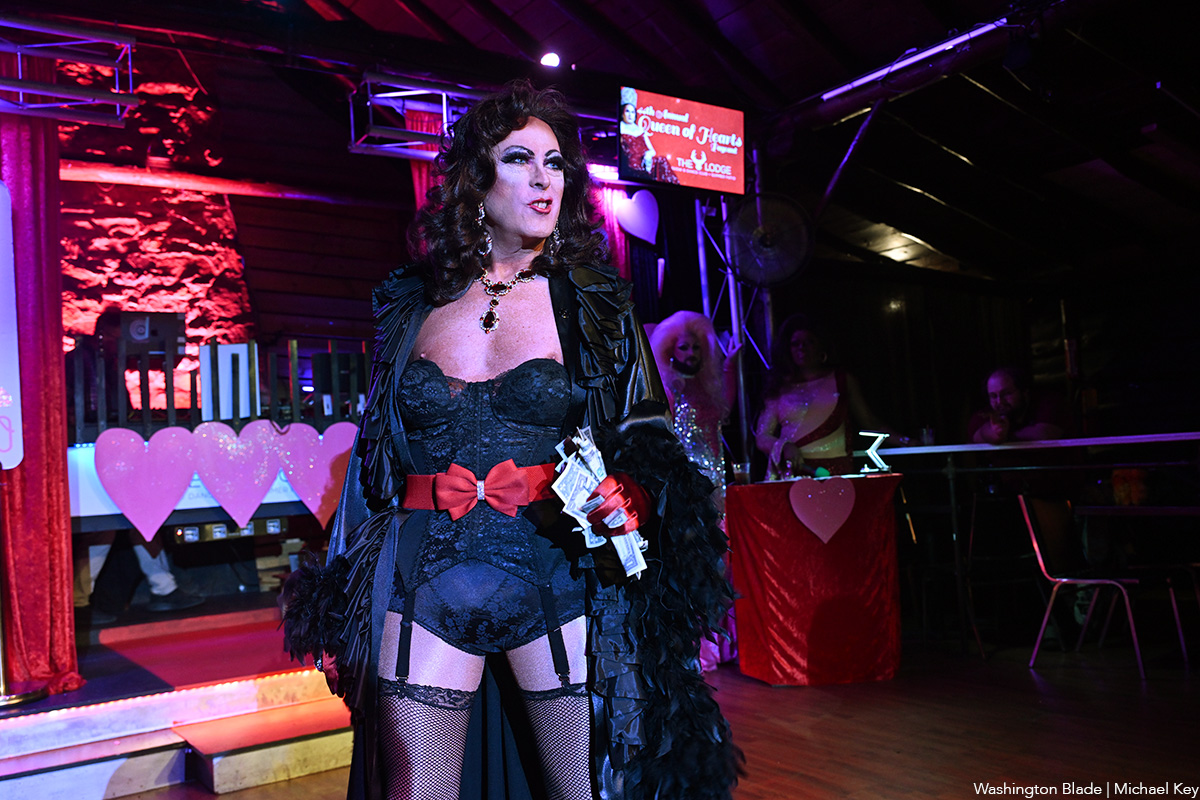
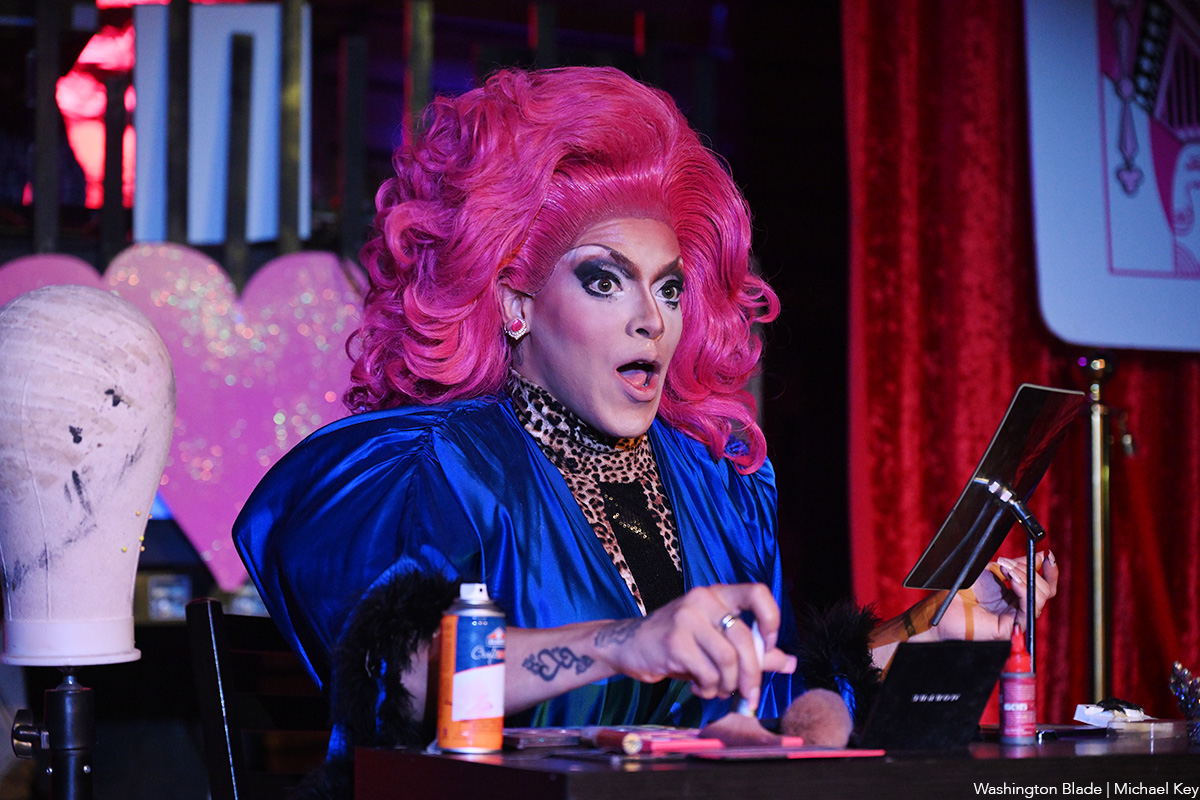
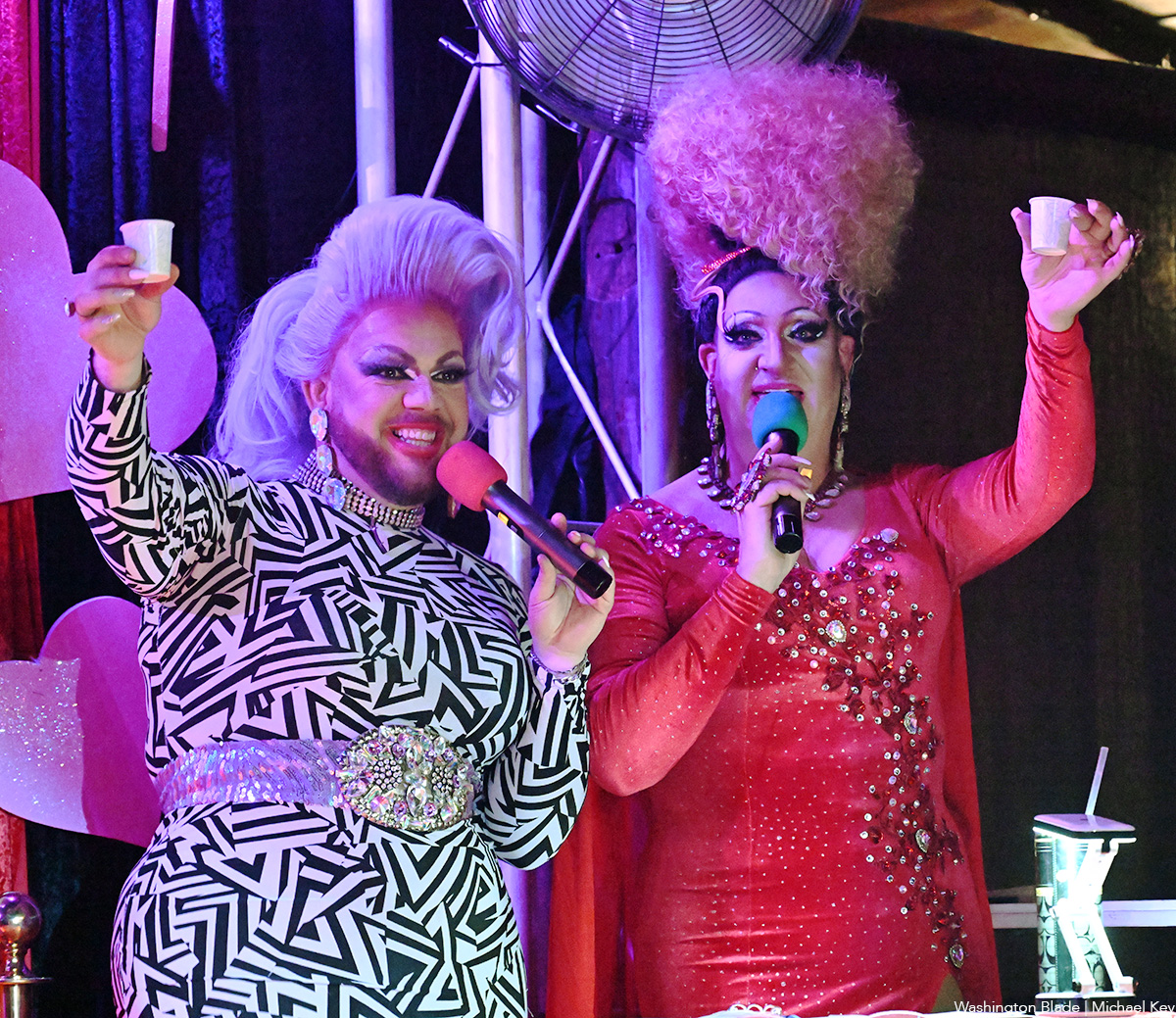
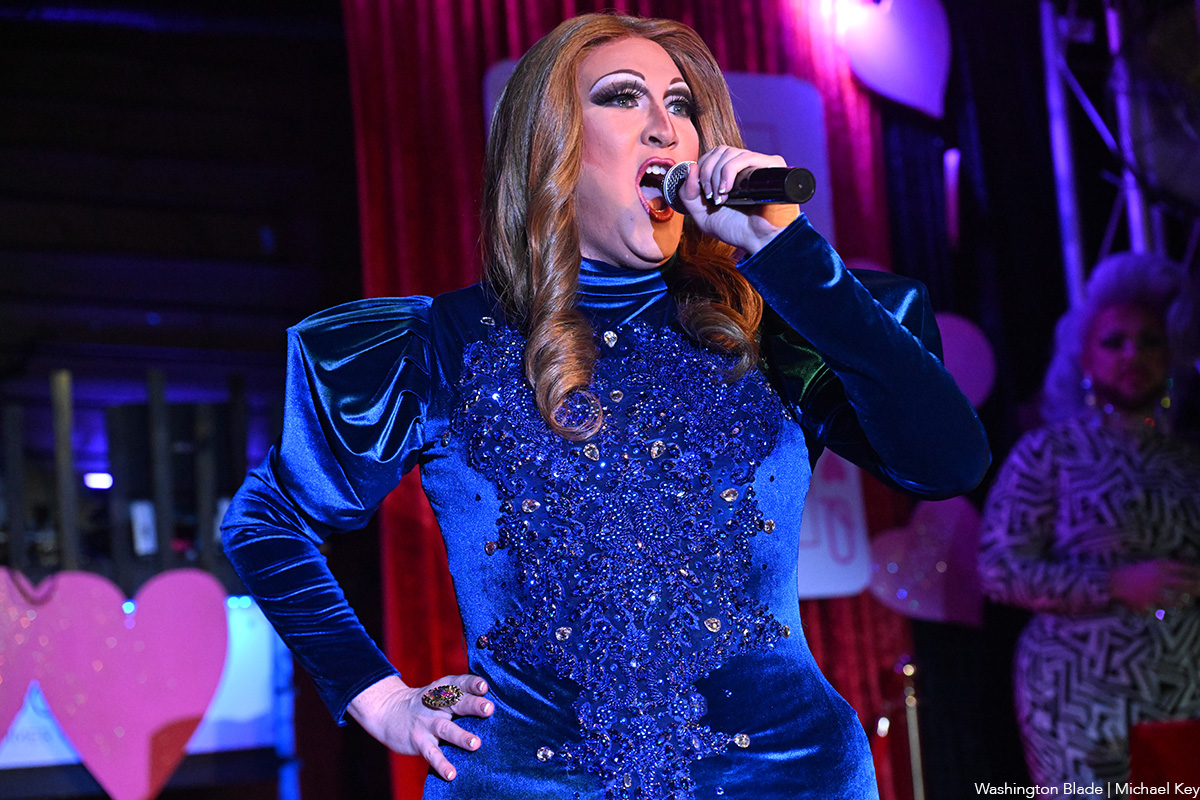
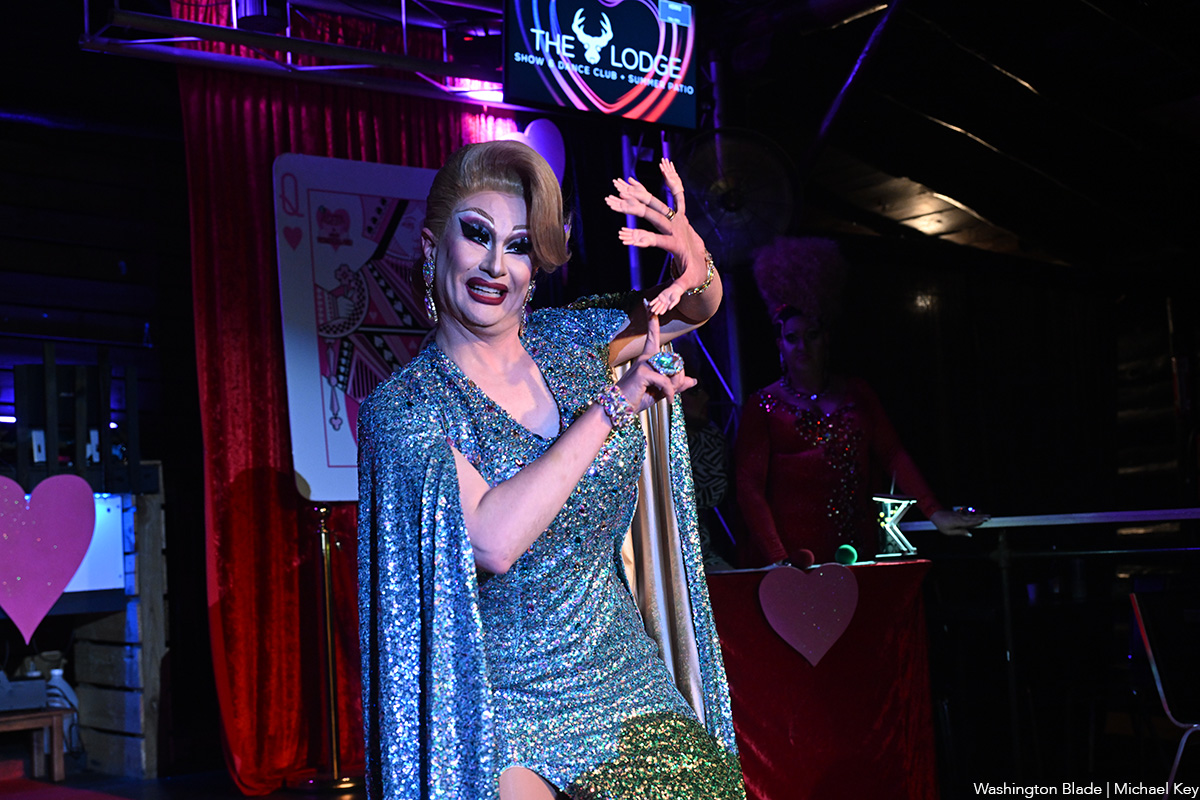
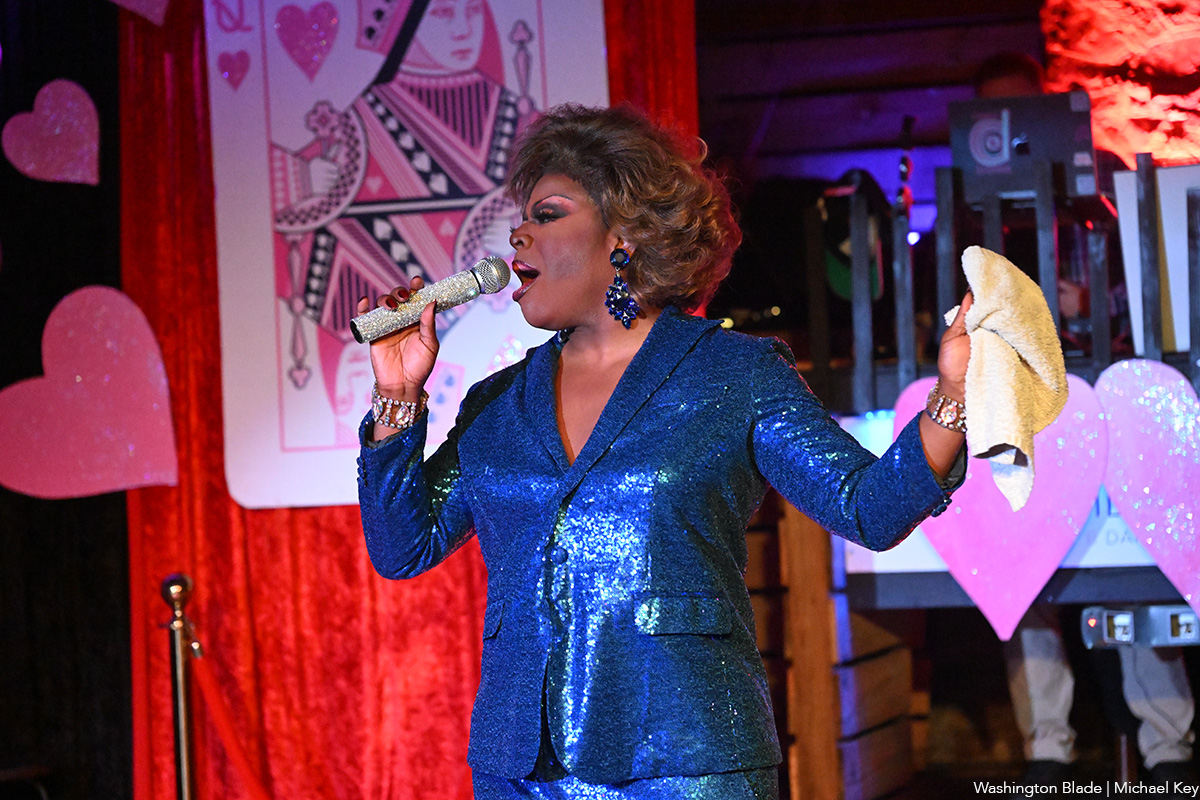
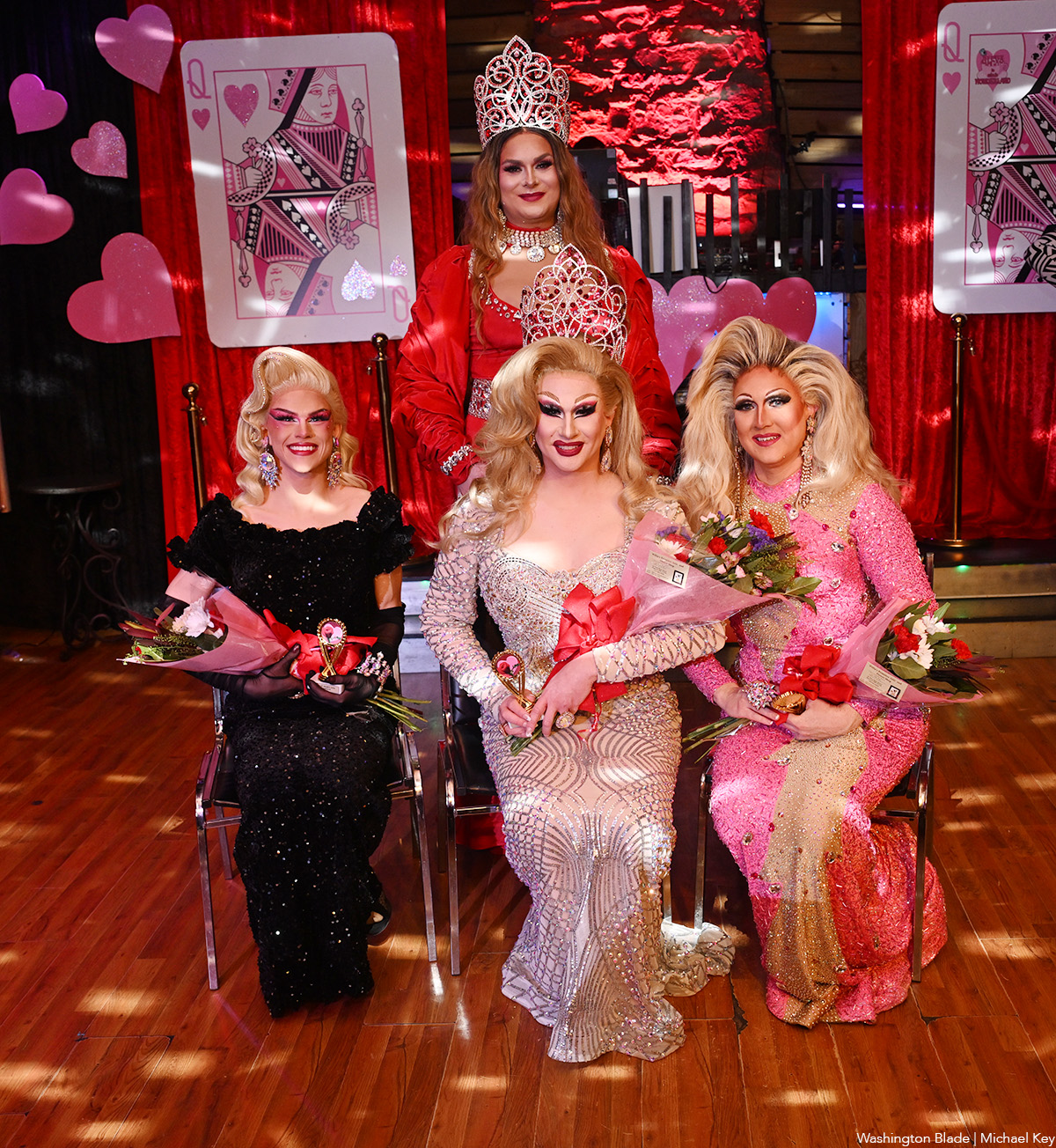
View on Threads



